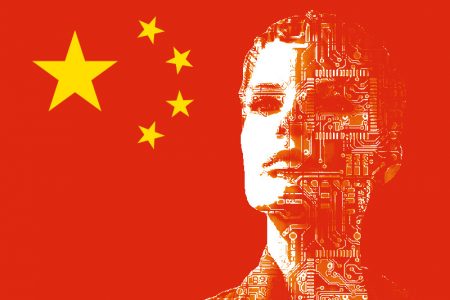August 20, 2018 – In the latest series of email blasts from Peter Diamandis he has focused on China’s aggressive push to become the leader of the world in artificial intelligence (AI) technology by 2030. When I first read Diamandis’ content it came on the same day that I received a Reuters/Global Times news release about a Chinese company WMDOLL making AI-enhanced sex dolls supported by a vocabulary supplied by the Chinese technology giant, Baidu, WMDOLL’s products are 80% sold overseas with half going to the U.S. Why AI in a sex doll? I guess sometimes you need to ask it a question. But more seriously, AI is core to China’s national effort to become top dog in technology. Diamandis gives us some of the statistical evidence for just how serious the country’s efforts are in trying to overtake the United States. He quotes Eric Schmidt, of Alphabet fame, “It’s pretty simple. By 2020, they will have caught up. By 2025 they will be better than us. By 2030 they will dominate the industries of AI.”
With a $14 trillion GDP, China is predicted to account for over 35% of global economic growth between 2017 and 2019. That’s nearly double the U.S. GDPs predicted 18%. AI is responsible for a big chunk of that.
PricewaterhouseCoopers recently projected AI deployment will add $15.7 trillion USD to the global GDP by 2030 of which China will take home $7 trillion dwarfing North America’ $3.7 trillion in gains. Another comparison, in 2017, China accounted for 48% of the world’s total AI startup funding compared to America’s 38%. Chinese investments in AI, chips and electric vehicles has already reached an estimated $300 billion. And AI giant, Alibaba, has unveiled plans to invest $15 billion in international research being done in labs in the U.S., Israel, and other locales. Beijing is mobilizing its government officials to support AI entrepreneurship and research and putting billions into venture capital investments. And behind the scenes, the country is cultivating a growing force of AI entrepreneurs trained in cutting-edge algorithms using some of the largest datasets available on the planet.
In a book, AI Superpowers, authored by Kai-Fu Lee, he describes the four main drivers tipping the balance in China’s favor:
- Abundant data
- Hungry entrepreneurs empowered by new tools
- Growing AI expertise
- Mass government funding and support
1. Abundant Data
Perhaps China’s biggest advantage is in its sheer quantity of data. Tencent’s WeChat platform alone has over 889 million daily active users. That’s more than the entire population of Europe. Take mobile payments spending: China outstrips the U.S. by a ratio of 50 to 1. Chinese e-commerce purchases are almost double U.S. totals. In 2017 alone, China’s ride-hailing company Didi Chuxing completed 7.43 billion rides. Uber and Lyft rides combined amounted to 4.4 billion the same year. And when it comes to bike-sharing rides, Chinese companies are outpacing U.S. competitors at a ratio of 300 to 1.
China’s data advantage involves more than just the volume. As China witnesses an explosion of startups, the data being created provides a new intelligence layer unparalleled in western countries. Where U.S. user payments and transportation data are spread across various platforms, Chinese AI giants like Tencent, are producing unified online ecosystems with all user data in one place.
Here’s just one example related to mobile payments. While the U.S. saw $112 billion worth of mobile payments in 2016, Chinese mobile payments exceeded $9 trillion in the same year. That means mobile payment platforms like WeChat Wallet and Alipay include data on everything from dumpling purchases from street vendors to recent 100 RMB donations to an earthquake relief fund. The result is the ability to generate complex maps charting hundreds of millions of users and their every move and transaction. For bike-sharing startups like China’s ofo and Mobike, the companies can harness deeply textured maps of population movement, allowing them to intuit everything about individual work habits and shopping routines. And as China’s facial recognition AI capability grows the maps are increasingly being populated by faces. Silicon Valley has nothing to compare with the enormity of data concentration available to Chinese competitors.
2. Hungry Entrepreneurs
China’s foray into the world of AI began with a copycat culture of mediocre and unoriginal products. But it also planted seeds for a competitive, entrepreneurial industry focused on beating the competition. Former founder-director of Google Brain, Andrew Ng, notes the drive and speed of Chinese entrepreneurs in this quote, “The velocity of work is much faster in China than in most of Silicon Valley. When you spot a business opportunity in China, the window of time you have to respond is very short.”
But as China’s AI expertise grows and startups learn to tailor their American copycat products to Chinese audiences, these companies are breaking out of the mold and building businesses with no analogs in the West. Now home to three of the seven AI Giants (Baidu, Alibaba, and Tencent), China is now approaching equality with Silicon Valley in the marketplace. Just this year, China’s computer vision startup SenseTime became the most valuable AI startup in the world. SenseTime can identify a face, gauging age and even potential purchasing habits. The company is now a world-class leader in facial recognition technologies, applying its AI to everything from traffic surveillance to employee authorization. After a $600 million Alibaba-led funding round in April, SenseTime raised an additional $620 million in a Series C+ round it announced in May and now claims a valuation of over $4.5 billion.
SenseTime is not alone. As of this past April, China is home to 168 unicorns, privately held startup companies worth over $1 billion, collectively valued at over $628 billion.
3. AI Expertise
It is important to note that China is still new to AI. When deep learning and neural networks were first demonstrated in 2012 showing their merits in an international computer vision contest, China had barely awakened to the AI revolution. But since then the country’s AI community has been catching up. The world elite AI researchers are still largely clustered in the United States favouring companies like Google, but China’s own technology giants have closed the gap. Already Chinese AI researchers in universities are on a par with their American contemporaries as demonstrated at the AAAI 2017 conference when an equal number of accepted papers came from American and Chinese researchers. Increasing collaboration is happening between China’s top tech firms and emerging student talent. Tencent, for instance, sponsors scholarships for students at a laboratory in Hong Kong’s University of Science and Technology, and grants access to masses of WeChat data. Baidu, Didi, and Tencent have all set up their own research laboratories.
China’s Face++ now leads the world in AI face and image recognition beating out Google, Microsoft, and Facebook last year in the COCO image-recognition competition. Voice recognition software company, iFlyTek, is outcompeting teams from Alphabet’s DeepMind, Facebook, and IBM Watson in natural-language processing, and has done so in its second language, English. Now the most valuable AI speech company in the world, iFlyTek’s cutting-edge technology could, one day, produce the universal translator worn as an earpiece.
4. China’s Government Directive
The day DeepMind’s AlphaGo beat top-ranking Chinese Go player Ke Jie has gone down in history as China’s “Sputnik Moment.” Within two months of the victory, the government issued its plan to make the country the global centre of AI innovation with an investment of 1 trillion RMB (about $150 billion USD) by 2030. And although America issued an AI strategic plan in 2016, the Chinese New Generation AI Development Plan released in July 2017 got far more notice and news coverage than the former. Why? Because when China’s government speaks, everyone in the country listens. Within a year, Chinese venture capital investors were pouring record sums into AI startups, surpassing the U.S. to make up the 48% of AI venture funding globally.
China over the past decade has been spending on STEM research growing government investment by double digits annually. The country’s political system is set up to provide incentives to local officials to compete with others for leadership in government initiatives with each striving to lure AI companies and entrepreneurs to their cities and region through generous subsidies and policies. Mayors across the country have been building innovation zones, incubators, and government-backed venture capital fund resources. They even cover new startup rents. In Beijing, the country’s capital, the city plans to invest $2 billion in an AI development park which would house up to 400 AI companies and a national laboratory to drive research and development, patent filings, and societal innovation. Hangzhou, home to Alibaba’s headquarters, has launched its own AI park, backed by a 10 billion RMB (nearly $1.6 billion USD) fund. Hangzhou and Beijing are just two of 19 different cities and provinces makeing investments in AI-driven city infrastructure and policy. Last week, the Xiong’an New Area announced it is building out entire AI cities over the next two decades, centered around autonomous vehicles, solar panel-embedded roads, and computer vision-geared infrastructure. The amount being spent over the next 20 years amounts to over $580 billion.
Local governments are teaming with China’s leading AI companies in building party-corporate complexes. Acting as a “national team,” companies like Baidu, Alibaba, Tencent and iFlyTek are collaborating with national organizations like China’s National Engineering Lab for Deep Learning Technologies to pioneer research and supercharge innovation. Pulling out all the stops, the government of China is flooding the market with AI-targeted funds and Chinese tech giants and adrenalized startups are leveraging the capital.
















